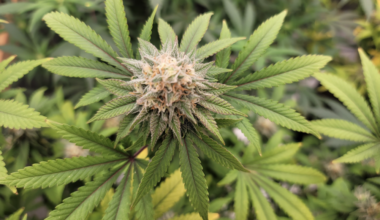The North Carolina Senate on Monday gave its final approval to a bill to legalize medical marijuana on Monday, sending it to the House of Representatives, where its prospects are in doubt.
Days after giving the bill from Sen. Bill Rabon (R) initial approval on second reading, the full Senate passed the NC Compassionate Care Act in a 37-6 third reading vote.
The legislation moved through four committees before finally reaching the floor this month. Now all eyes are turned to the House, where its chances of passage as drafted are in question based on recent comments from leadership in that chamber.
House Speaker Tim Moore (R) told WRAL last week that “there are a lot of concerns with this bill right now.”
“I think it’s something that’s going to really require further study,” he said, echoing comments he has made in recent weeks about not wanting to take up the measure until next session. “The Senate brought this bill quickly to the floor. This is one of the more controversial subjects in our in our state and in our nation.”
The comment about the expediency of the Senate’s approach to this legislation is questionable, as it received ample committee consideration going back to July 2021.
“I, like many, do recognize there are some medical conditions where, you know, the data is out there and this can be helpful in certain limited instances,” Moore said, citing the passage of a bill providing limited access to CBD for patients with conditions such as epilepsy.
“But I think when you take that next leap into actual medical marijuana, there are a host of other issues there,” he continued. “The biggest concern is the abuse of it, how easy is it for someone to get ‘diagnosed and prescribed’ this as a medication, and I think that there needs to be a lot of precautions in place.”
At the very least, the speaker seems to be signaling that the chamber would push for significant, restrictive amendments to the already relatively limited medical cannabis bill. He cited additional concerns about impaired driving if the state moves to permit patients to access the plant.
“I don’t know that it’s as partisan as it might seem, really,” he said. “But I think we really need a good, thoughtful discussion on this and really follow what the science is behind what medical professionals recommend before we actually take any action on that one way or the other.”
There’s also a time-crunch at play, too, with the short legislative session set to end on June 30. The speaker previously said that issues such as medical cannabis and Medicaid reform “are issues that need to be dealt with in a long session.”
Here’s what the NC Compassionate Care Act would accomplish:
Patients would be allowed to access cannabis if they have a “debilitating medical condition” such as cancer, epilepsy, HIV/AIDS, Parkinson’s disease, multiple sclerosis and post-traumatic stress disorder.
The committee substitute adopted in in August by the Senate Judiciary Committee changed the list somewhat to allow patients with terminal illnesses and have six months to live, as well as those with conditions resulting in hospice care, to also qualify for cannabis.
Patients could possess up to one and a half ounces of marijuana, but home cultivation would not be permitted.
The definition of what constitutes a “cannabis-infused” product was also changed in the latest substitute version. Such products include “a tablet, a capsule, a concentrated liquid or viscous oil, a liquid suspension, a topical preparation, a transdermal preparation, a sublingual preparation, a gelatinous cube, gelatinous rectangular cuboid, lozenge in a cube or rectangular cuboid shape, a resin or wax.”
Smoking and vaping would also be allowed, but doctors would need to prescribe a specific method of delivery and dosages for patients under the revised legislation. And they would need to reevaluate patients’ eligibility for the program at least once a year.
The bill provides for up to 10 medical marijuana suppliers who control the cultivation and sale of cannabis. Each supplier can operate up to four dispensaries.
Under the bill, a Compassionate Use Advisory Board would be established, and it could add new qualifying medical conditions.
Separately, a Medical Cannabis Production Commission would be created to ensure that there’s an adequate supply of cannabis for patients, oversee licensing and generate enough revenue to regulate the program.
Advocates are still hoping to see further revisions to expand the proposed program and promote social equity.
The measure would further create a North Carolina Cannabis Research Program to “undertake objective, scientific research regarding the administration of cannabis or cannabis-infused products as part of medical treatment.”
There are also protections for patients included in the latest version. It stipulates that employees and agents of the state must treat possession of cannabis for qualified patients the same as any other prescribed controlled substance.
Further, the bill includes limitations on where marijuana can be smoked or vaped, and includes restrictions on the locations and hours of operation for medical cannabis businesses. It also allows regulators to place a “limitation on the number of written certifications a physician may issue at any given time.”
—
Marijuana Moment is already tracking more than 1,000 cannabis, psychedelics and drug policy bills in state legislatures and Congress this year. Patreon supporters pledging at least $25/month get access to our interactive maps, charts and hearing calendar so they don’t miss any developments.![]()
Learn more about our marijuana bill tracker and become a supporter on Patreon to get access.
—
A new poll from the Carolina Partnership for Reform found that 82 percent of North Carolina voters are in favor of legalizing medical cannabis—including 75 percent of Republicans, 87 percent of unaffiliated voters and 86 percent of Democrats.
A separate question found that 60 percent of voters back adult-use legalization.
The new survey shows a rise in increase for support for medical cannabis legalization since voters were prompted with the question earlier this year, with the results showing that with three in four say patients should have access to marijuana for medical use.
While advocates have their doubts about broad reform being enacted in North Carolina this session, Senate President Pro Tempore Phil Berger (R) has acknowledged that opinions are shifting when it comes to marijuana in the state, and he said that Rabon specifically “for a long time has looked at the issue.”
“I do sense that public opinion is changing on marijuana—both medical and recreational,” Rabon said previously. “I don’t know where the members of the General Assembly are at this time in terms of support for the bill, but it’s something we’ll look at and we’ll see how things move along.”
A task force convened by North Carolina Gov. Roy Cooper (D) backed decriminalization as part of a series of policy recommendations on racial equity that were released in 2020. The group also said prior cannabis convictions should be expunged and the state should consider whether to more broadly legalize marijuana.
Under current law, possessing more than half an ounce up to 1.5 ounces of cannabis is a class 1 misdemeanor, subject to up to 45 days imprisonment and a $200 fine. In 2019, there were 3,422 such charges and 1,909 convictions, with 70 percent of those convicted being nonwhite.
Voters In Five Texas Cities Will Decide On Marijuana Decriminalization In November, Activists Say
Photo courtesy of Chris Wallis // Side Pocket Images.
Medical Disclaimer:
The information provided in these blog posts is intended for general informational and educational purposes only. It is not a substitute for professional medical advice, diagnosis, or treatment. Always seek the advice of your physician or other qualified healthcare provider with any questions you may have regarding a medical condition. The use of any information provided in these blog posts is solely at your own risk. The authors and the website do not recommend or endorse any specific products, treatments, or procedures mentioned. Reliance on any information in these blog posts is solely at your own discretion.







